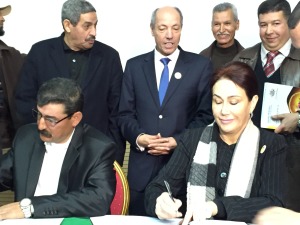
Moroccan Labor Minister Abdeslam Seddiki (standing, center), employer Rita Zniber and Bouchta Boukhalfa, the leader of CDT in Meknes (standing, left), take part in the signing ceremony. Credit: Colette Young/Solidarity Center
Under the agreement, workers receive bonuses if their work exceeds the norm. The agro-industry employer must provide safety equipment and enroll in Morocco’s social security system, enabling workers to access worker compensation and other fundamental protections. Workers will now be employed under contracts, giving them job security, and will receive paid overtime, holidays and vacation, and a transportation allowance.
Crucially, this agreement– formalized during a ceremony with 400 workers, employers, labor leaders and government officials taking part–will guarantee their right to freedom of association.
“This agreement will ensure stability in employment,”says Abdelali Bouhiyadi, a union representative. “Even seasonal workers will keep their jobs and stay on the farms. Seasonal workers will be integrated gradually and the agreement will ensure social peace because a committee on conflict and negotiation will be established.”
Agriculture is a cornerstone of Morocco’s economy, with high-quality agricultural products, such as wine and olive oil, exported to Europe. Some 43 percent of workers in Morocco are employed in the country’s agriculture sector, and most are women.
“This agreement will allow us to have the opportunity to be trained in our jobs,” says Hayat El Khomssi, an agricultural worker. “Women always performed specific tasks, and when these tasks were no longer needed, they were laid off. Now, things will change: Women will be able to continue working, accrue seniority and benefit from trainings.”
As the first of its kind collective bargaining agreement in the region, it is an important contribution to sustainable development and economic stability in Morocco, and will serve as a model for others to follow in Morocco and throughout the region.
CDT leaders say this victory is an important step toward achieving the union’s vision of a sector-wide collective bargaining agreement for agricultural workers, one with the potential of improving the working conditions of more than 300,000 workers in Morocco.
Article written by Tula Connell, originally published on the website of Solidarity Center

